Comprehensive Analysis of Festival and Special Events Planning Essay
VerifiedAdded on 2020/06/06
|8
|2974
|78
Essay
AI Summary
This essay provides a comprehensive overview of event planning, exploring the historical significance of events and their role in bringing people together for various purposes. It delves into the diverse types of events, including personal, religious, sporting, business, national, commemorative, community, and political events, highlighting their unique characteristics and objectives. The essay emphasizes the importance of event tourism in driving economic development and sustainability, examining how events are planned and managed to cater to tourists' needs and promote cultural exchange. It discusses the three key sectors involved in event organization: government, corporate, and community, and their collaborative roles in ensuring successful event outcomes. The essay also underscores the relationship between the event industry and regional environmental development, as well as the impact of culture and the overall environment on event success.
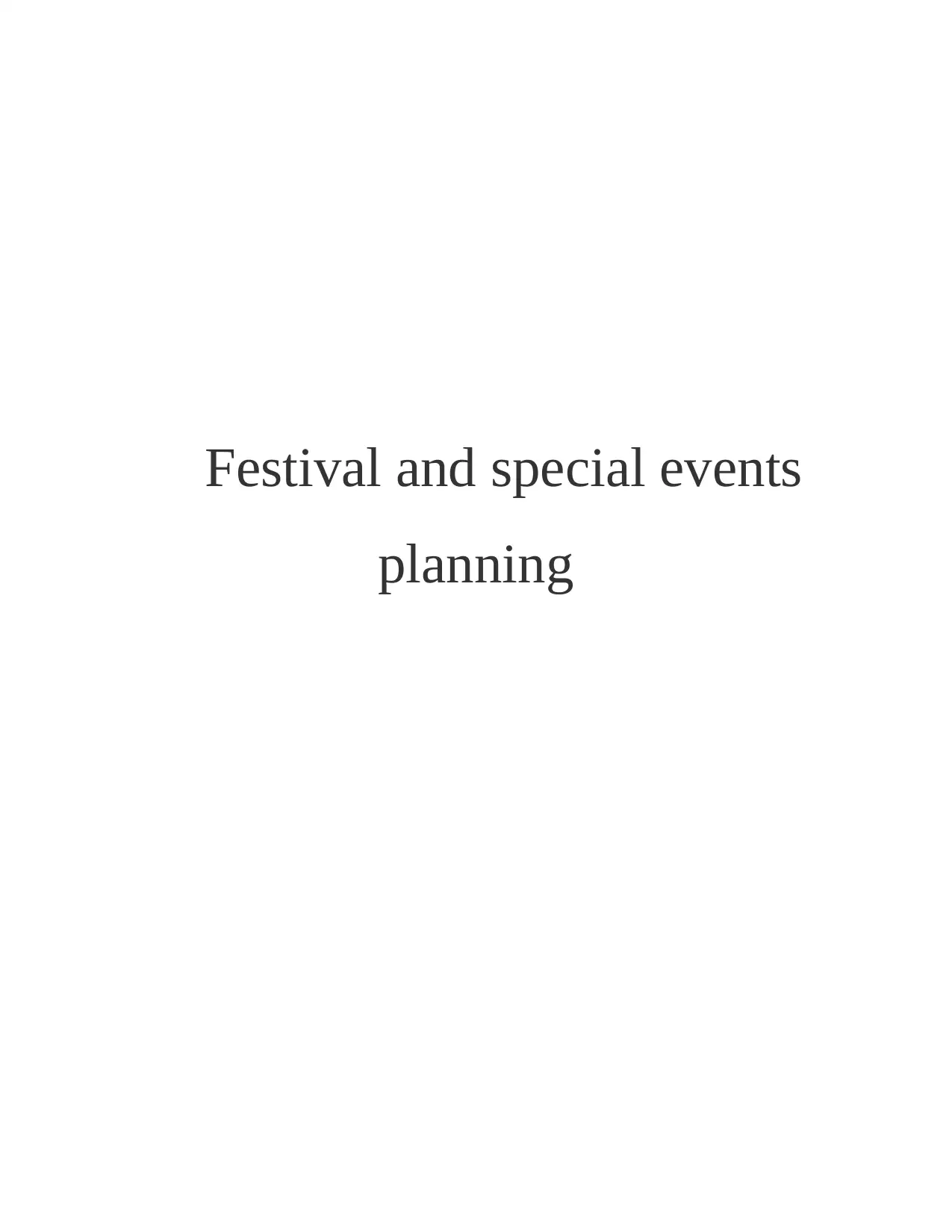
Festival and special events
planning
planning
Paraphrase This Document
Need a fresh take? Get an instant paraphrase of this document with our AI Paraphraser
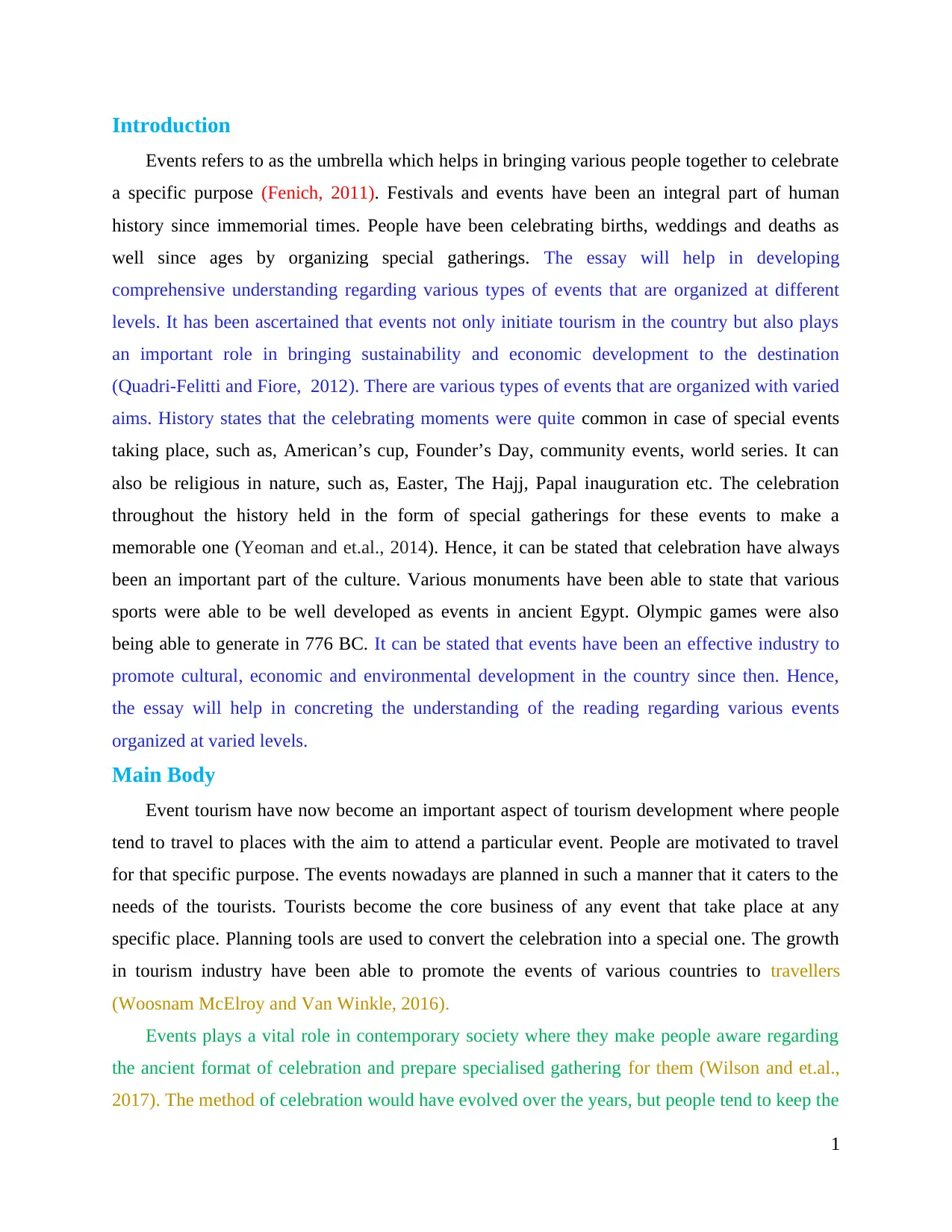
Introduction
Events refers to as the umbrella which helps in bringing various people together to celebrate
a specific purpose (Fenich, 2011). Festivals and events have been an integral part of human
history since immemorial times. People have been celebrating births, weddings and deaths as
well since ages by organizing special gatherings. The essay will help in developing
comprehensive understanding regarding various types of events that are organized at different
levels. It has been ascertained that events not only initiate tourism in the country but also plays
an important role in bringing sustainability and economic development to the destination
(Quadri-Felitti and Fiore, 2012). There are various types of events that are organized with varied
aims. History states that the celebrating moments were quite common in case of special events
taking place, such as, American’s cup, Founder’s Day, community events, world series. It can
also be religious in nature, such as, Easter, The Hajj, Papal inauguration etc. The celebration
throughout the history held in the form of special gatherings for these events to make a
memorable one (Yeoman and et.al., 2014). Hence, it can be stated that celebration have always
been an important part of the culture. Various monuments have been able to state that various
sports were able to be well developed as events in ancient Egypt. Olympic games were also
being able to generate in 776 BC. It can be stated that events have been an effective industry to
promote cultural, economic and environmental development in the country since then. Hence,
the essay will help in concreting the understanding of the reading regarding various events
organized at varied levels.
Main Body
Event tourism have now become an important aspect of tourism development where people
tend to travel to places with the aim to attend a particular event. People are motivated to travel
for that specific purpose. The events nowadays are planned in such a manner that it caters to the
needs of the tourists. Tourists become the core business of any event that take place at any
specific place. Planning tools are used to convert the celebration into a special one. The growth
in tourism industry have been able to promote the events of various countries to travellers
(Woosnam McElroy and Van Winkle, 2016).
Events plays a vital role in contemporary society where they make people aware regarding
the ancient format of celebration and prepare specialised gathering for them (Wilson and et.al.,
2017). The method of celebration would have evolved over the years, but people tend to keep the
1
Events refers to as the umbrella which helps in bringing various people together to celebrate
a specific purpose (Fenich, 2011). Festivals and events have been an integral part of human
history since immemorial times. People have been celebrating births, weddings and deaths as
well since ages by organizing special gatherings. The essay will help in developing
comprehensive understanding regarding various types of events that are organized at different
levels. It has been ascertained that events not only initiate tourism in the country but also plays
an important role in bringing sustainability and economic development to the destination
(Quadri-Felitti and Fiore, 2012). There are various types of events that are organized with varied
aims. History states that the celebrating moments were quite common in case of special events
taking place, such as, American’s cup, Founder’s Day, community events, world series. It can
also be religious in nature, such as, Easter, The Hajj, Papal inauguration etc. The celebration
throughout the history held in the form of special gatherings for these events to make a
memorable one (Yeoman and et.al., 2014). Hence, it can be stated that celebration have always
been an important part of the culture. Various monuments have been able to state that various
sports were able to be well developed as events in ancient Egypt. Olympic games were also
being able to generate in 776 BC. It can be stated that events have been an effective industry to
promote cultural, economic and environmental development in the country since then. Hence,
the essay will help in concreting the understanding of the reading regarding various events
organized at varied levels.
Main Body
Event tourism have now become an important aspect of tourism development where people
tend to travel to places with the aim to attend a particular event. People are motivated to travel
for that specific purpose. The events nowadays are planned in such a manner that it caters to the
needs of the tourists. Tourists become the core business of any event that take place at any
specific place. Planning tools are used to convert the celebration into a special one. The growth
in tourism industry have been able to promote the events of various countries to travellers
(Woosnam McElroy and Van Winkle, 2016).
Events plays a vital role in contemporary society where they make people aware regarding
the ancient format of celebration and prepare specialised gathering for them (Wilson and et.al.,
2017). The method of celebration would have evolved over the years, but people tend to keep the
1
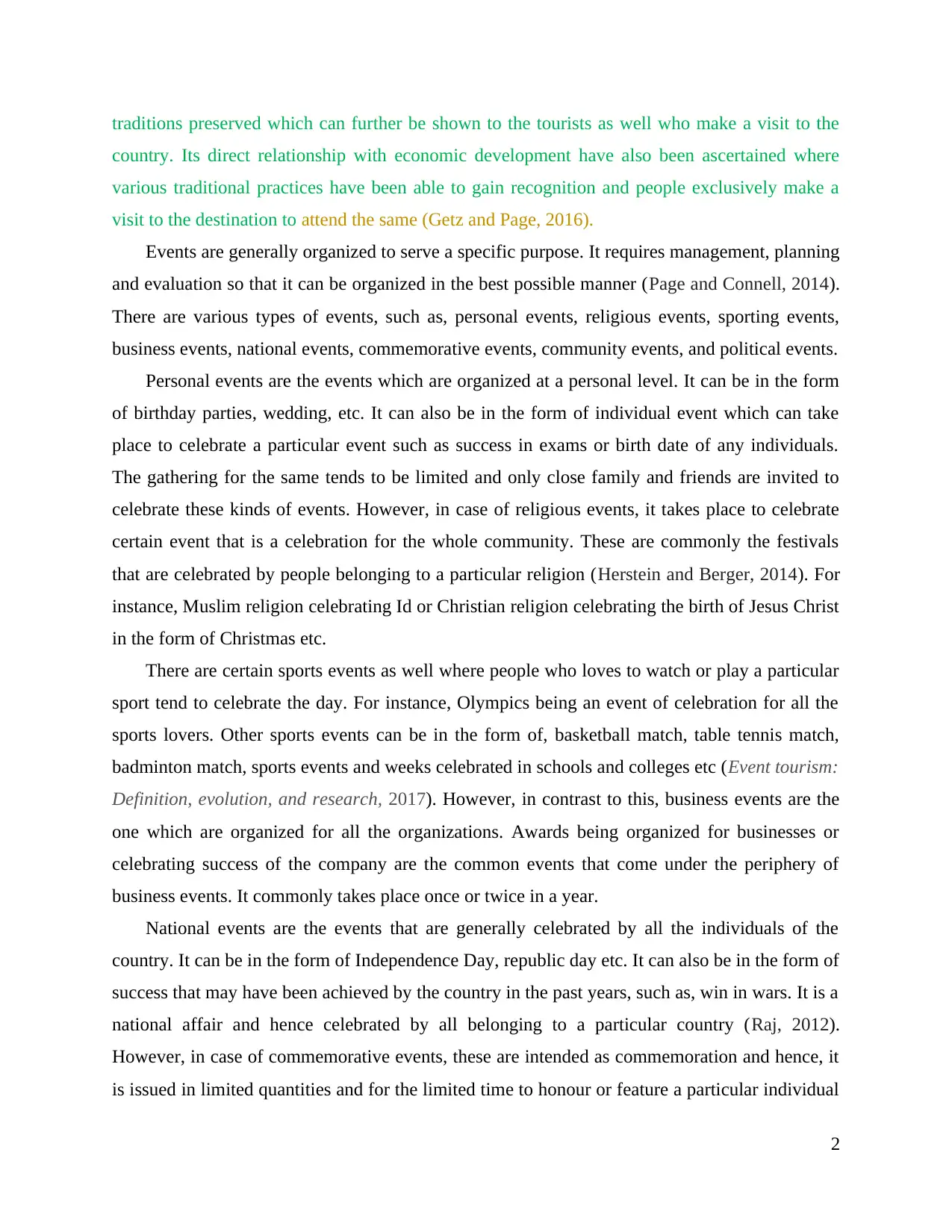
traditions preserved which can further be shown to the tourists as well who make a visit to the
country. Its direct relationship with economic development have also been ascertained where
various traditional practices have been able to gain recognition and people exclusively make a
visit to the destination to attend the same (Getz and Page, 2016).
Events are generally organized to serve a specific purpose. It requires management, planning
and evaluation so that it can be organized in the best possible manner (Page and Connell, 2014).
There are various types of events, such as, personal events, religious events, sporting events,
business events, national events, commemorative events, community events, and political events.
Personal events are the events which are organized at a personal level. It can be in the form
of birthday parties, wedding, etc. It can also be in the form of individual event which can take
place to celebrate a particular event such as success in exams or birth date of any individuals.
The gathering for the same tends to be limited and only close family and friends are invited to
celebrate these kinds of events. However, in case of religious events, it takes place to celebrate
certain event that is a celebration for the whole community. These are commonly the festivals
that are celebrated by people belonging to a particular religion (Herstein and Berger, 2014). For
instance, Muslim religion celebrating Id or Christian religion celebrating the birth of Jesus Christ
in the form of Christmas etc.
There are certain sports events as well where people who loves to watch or play a particular
sport tend to celebrate the day. For instance, Olympics being an event of celebration for all the
sports lovers. Other sports events can be in the form of, basketball match, table tennis match,
badminton match, sports events and weeks celebrated in schools and colleges etc (Event tourism:
Definition, evolution, and research, 2017). However, in contrast to this, business events are the
one which are organized for all the organizations. Awards being organized for businesses or
celebrating success of the company are the common events that come under the periphery of
business events. It commonly takes place once or twice in a year.
National events are the events that are generally celebrated by all the individuals of the
country. It can be in the form of Independence Day, republic day etc. It can also be in the form of
success that may have been achieved by the country in the past years, such as, win in wars. It is a
national affair and hence celebrated by all belonging to a particular country (Raj, 2012).
However, in case of commemorative events, these are intended as commemoration and hence, it
is issued in limited quantities and for the limited time to honour or feature a particular individual
2
country. Its direct relationship with economic development have also been ascertained where
various traditional practices have been able to gain recognition and people exclusively make a
visit to the destination to attend the same (Getz and Page, 2016).
Events are generally organized to serve a specific purpose. It requires management, planning
and evaluation so that it can be organized in the best possible manner (Page and Connell, 2014).
There are various types of events, such as, personal events, religious events, sporting events,
business events, national events, commemorative events, community events, and political events.
Personal events are the events which are organized at a personal level. It can be in the form
of birthday parties, wedding, etc. It can also be in the form of individual event which can take
place to celebrate a particular event such as success in exams or birth date of any individuals.
The gathering for the same tends to be limited and only close family and friends are invited to
celebrate these kinds of events. However, in case of religious events, it takes place to celebrate
certain event that is a celebration for the whole community. These are commonly the festivals
that are celebrated by people belonging to a particular religion (Herstein and Berger, 2014). For
instance, Muslim religion celebrating Id or Christian religion celebrating the birth of Jesus Christ
in the form of Christmas etc.
There are certain sports events as well where people who loves to watch or play a particular
sport tend to celebrate the day. For instance, Olympics being an event of celebration for all the
sports lovers. Other sports events can be in the form of, basketball match, table tennis match,
badminton match, sports events and weeks celebrated in schools and colleges etc (Event tourism:
Definition, evolution, and research, 2017). However, in contrast to this, business events are the
one which are organized for all the organizations. Awards being organized for businesses or
celebrating success of the company are the common events that come under the periphery of
business events. It commonly takes place once or twice in a year.
National events are the events that are generally celebrated by all the individuals of the
country. It can be in the form of Independence Day, republic day etc. It can also be in the form of
success that may have been achieved by the country in the past years, such as, win in wars. It is a
national affair and hence celebrated by all belonging to a particular country (Raj, 2012).
However, in case of commemorative events, these are intended as commemoration and hence, it
is issued in limited quantities and for the limited time to honour or feature a particular individual
2
⊘ This is a preview!⊘
Do you want full access?
Subscribe today to unlock all pages.

Trusted by 1+ million students worldwide
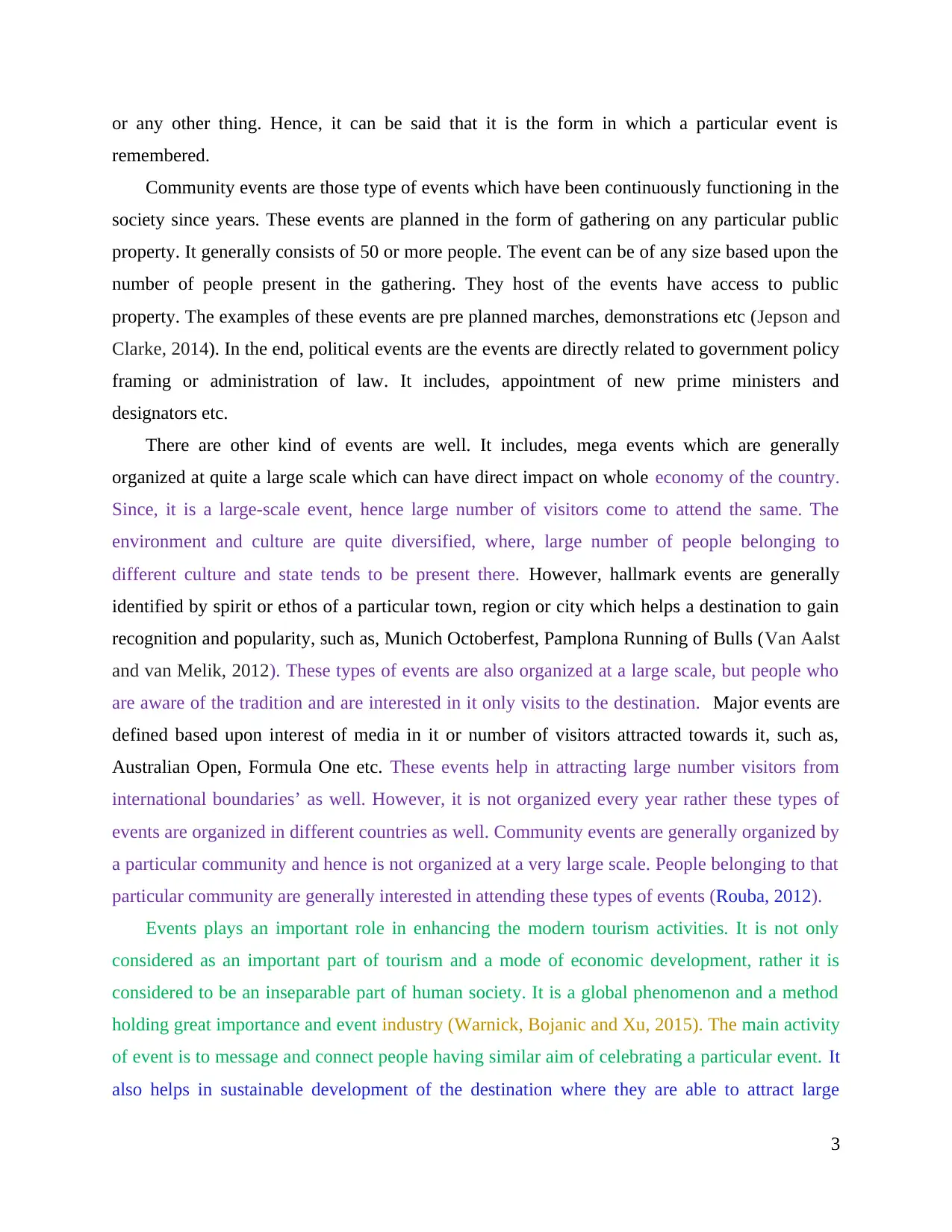
or any other thing. Hence, it can be said that it is the form in which a particular event is
remembered.
Community events are those type of events which have been continuously functioning in the
society since years. These events are planned in the form of gathering on any particular public
property. It generally consists of 50 or more people. The event can be of any size based upon the
number of people present in the gathering. They host of the events have access to public
property. The examples of these events are pre planned marches, demonstrations etc (Jepson and
Clarke, 2014). In the end, political events are the events are directly related to government policy
framing or administration of law. It includes, appointment of new prime ministers and
designators etc.
There are other kind of events are well. It includes, mega events which are generally
organized at quite a large scale which can have direct impact on whole economy of the country.
Since, it is a large-scale event, hence large number of visitors come to attend the same. The
environment and culture are quite diversified, where, large number of people belonging to
different culture and state tends to be present there. However, hallmark events are generally
identified by spirit or ethos of a particular town, region or city which helps a destination to gain
recognition and popularity, such as, Munich Octoberfest, Pamplona Running of Bulls (Van Aalst
and van Melik, 2012). These types of events are also organized at a large scale, but people who
are aware of the tradition and are interested in it only visits to the destination. Major events are
defined based upon interest of media in it or number of visitors attracted towards it, such as,
Australian Open, Formula One etc. These events help in attracting large number visitors from
international boundaries’ as well. However, it is not organized every year rather these types of
events are organized in different countries as well. Community events are generally organized by
a particular community and hence is not organized at a very large scale. People belonging to that
particular community are generally interested in attending these types of events (Rouba, 2012).
Events plays an important role in enhancing the modern tourism activities. It is not only
considered as an important part of tourism and a mode of economic development, rather it is
considered to be an inseparable part of human society. It is a global phenomenon and a method
holding great importance and event industry (Warnick, Bojanic and Xu, 2015). The main activity
of event is to message and connect people having similar aim of celebrating a particular event. It
also helps in sustainable development of the destination where they are able to attract large
3
remembered.
Community events are those type of events which have been continuously functioning in the
society since years. These events are planned in the form of gathering on any particular public
property. It generally consists of 50 or more people. The event can be of any size based upon the
number of people present in the gathering. They host of the events have access to public
property. The examples of these events are pre planned marches, demonstrations etc (Jepson and
Clarke, 2014). In the end, political events are the events are directly related to government policy
framing or administration of law. It includes, appointment of new prime ministers and
designators etc.
There are other kind of events are well. It includes, mega events which are generally
organized at quite a large scale which can have direct impact on whole economy of the country.
Since, it is a large-scale event, hence large number of visitors come to attend the same. The
environment and culture are quite diversified, where, large number of people belonging to
different culture and state tends to be present there. However, hallmark events are generally
identified by spirit or ethos of a particular town, region or city which helps a destination to gain
recognition and popularity, such as, Munich Octoberfest, Pamplona Running of Bulls (Van Aalst
and van Melik, 2012). These types of events are also organized at a large scale, but people who
are aware of the tradition and are interested in it only visits to the destination. Major events are
defined based upon interest of media in it or number of visitors attracted towards it, such as,
Australian Open, Formula One etc. These events help in attracting large number visitors from
international boundaries’ as well. However, it is not organized every year rather these types of
events are organized in different countries as well. Community events are generally organized by
a particular community and hence is not organized at a very large scale. People belonging to that
particular community are generally interested in attending these types of events (Rouba, 2012).
Events plays an important role in enhancing the modern tourism activities. It is not only
considered as an important part of tourism and a mode of economic development, rather it is
considered to be an inseparable part of human society. It is a global phenomenon and a method
holding great importance and event industry (Warnick, Bojanic and Xu, 2015). The main activity
of event is to message and connect people having similar aim of celebrating a particular event. It
also helps in sustainable development of the destination where they are able to attract large
3
Paraphrase This Document
Need a fresh take? Get an instant paraphrase of this document with our AI Paraphraser
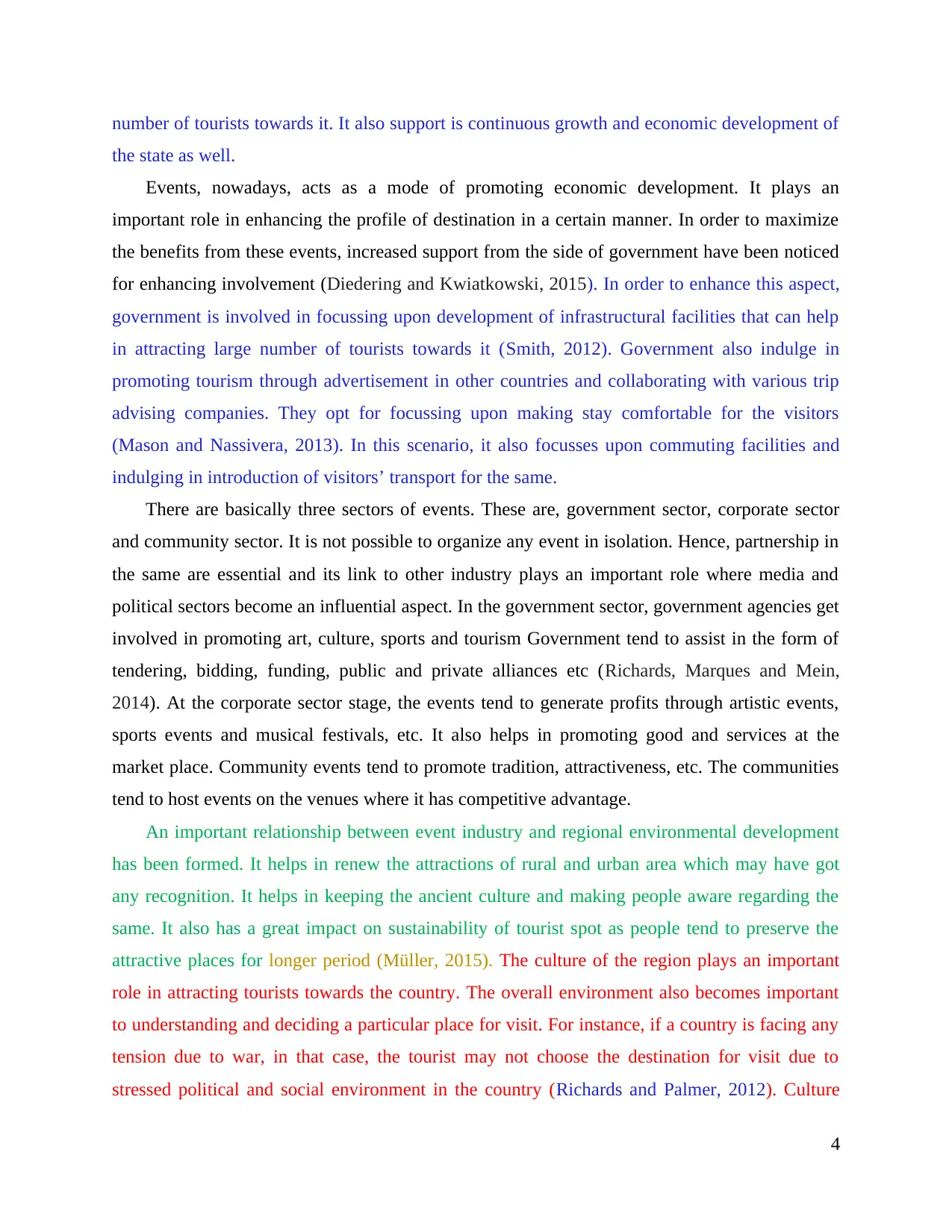
number of tourists towards it. It also support is continuous growth and economic development of
the state as well.
Events, nowadays, acts as a mode of promoting economic development. It plays an
important role in enhancing the profile of destination in a certain manner. In order to maximize
the benefits from these events, increased support from the side of government have been noticed
for enhancing involvement (Diedering and Kwiatkowski, 2015). In order to enhance this aspect,
government is involved in focussing upon development of infrastructural facilities that can help
in attracting large number of tourists towards it (Smith, 2012). Government also indulge in
promoting tourism through advertisement in other countries and collaborating with various trip
advising companies. They opt for focussing upon making stay comfortable for the visitors
(Mason and Nassivera, 2013). In this scenario, it also focusses upon commuting facilities and
indulging in introduction of visitors’ transport for the same.
There are basically three sectors of events. These are, government sector, corporate sector
and community sector. It is not possible to organize any event in isolation. Hence, partnership in
the same are essential and its link to other industry plays an important role where media and
political sectors become an influential aspect. In the government sector, government agencies get
involved in promoting art, culture, sports and tourism Government tend to assist in the form of
tendering, bidding, funding, public and private alliances etc (Richards, Marques and Mein,
2014). At the corporate sector stage, the events tend to generate profits through artistic events,
sports events and musical festivals, etc. It also helps in promoting good and services at the
market place. Community events tend to promote tradition, attractiveness, etc. The communities
tend to host events on the venues where it has competitive advantage.
An important relationship between event industry and regional environmental development
has been formed. It helps in renew the attractions of rural and urban area which may have got
any recognition. It helps in keeping the ancient culture and making people aware regarding the
same. It also has a great impact on sustainability of tourist spot as people tend to preserve the
attractive places for longer period (Müller, 2015). The culture of the region plays an important
role in attracting tourists towards the country. The overall environment also becomes important
to understanding and deciding a particular place for visit. For instance, if a country is facing any
tension due to war, in that case, the tourist may not choose the destination for visit due to
stressed political and social environment in the country (Richards and Palmer, 2012). Culture
4
the state as well.
Events, nowadays, acts as a mode of promoting economic development. It plays an
important role in enhancing the profile of destination in a certain manner. In order to maximize
the benefits from these events, increased support from the side of government have been noticed
for enhancing involvement (Diedering and Kwiatkowski, 2015). In order to enhance this aspect,
government is involved in focussing upon development of infrastructural facilities that can help
in attracting large number of tourists towards it (Smith, 2012). Government also indulge in
promoting tourism through advertisement in other countries and collaborating with various trip
advising companies. They opt for focussing upon making stay comfortable for the visitors
(Mason and Nassivera, 2013). In this scenario, it also focusses upon commuting facilities and
indulging in introduction of visitors’ transport for the same.
There are basically three sectors of events. These are, government sector, corporate sector
and community sector. It is not possible to organize any event in isolation. Hence, partnership in
the same are essential and its link to other industry plays an important role where media and
political sectors become an influential aspect. In the government sector, government agencies get
involved in promoting art, culture, sports and tourism Government tend to assist in the form of
tendering, bidding, funding, public and private alliances etc (Richards, Marques and Mein,
2014). At the corporate sector stage, the events tend to generate profits through artistic events,
sports events and musical festivals, etc. It also helps in promoting good and services at the
market place. Community events tend to promote tradition, attractiveness, etc. The communities
tend to host events on the venues where it has competitive advantage.
An important relationship between event industry and regional environmental development
has been formed. It helps in renew the attractions of rural and urban area which may have got
any recognition. It helps in keeping the ancient culture and making people aware regarding the
same. It also has a great impact on sustainability of tourist spot as people tend to preserve the
attractive places for longer period (Müller, 2015). The culture of the region plays an important
role in attracting tourists towards the country. The overall environment also becomes important
to understanding and deciding a particular place for visit. For instance, if a country is facing any
tension due to war, in that case, the tourist may not choose the destination for visit due to
stressed political and social environment in the country (Richards and Palmer, 2012). Culture
4
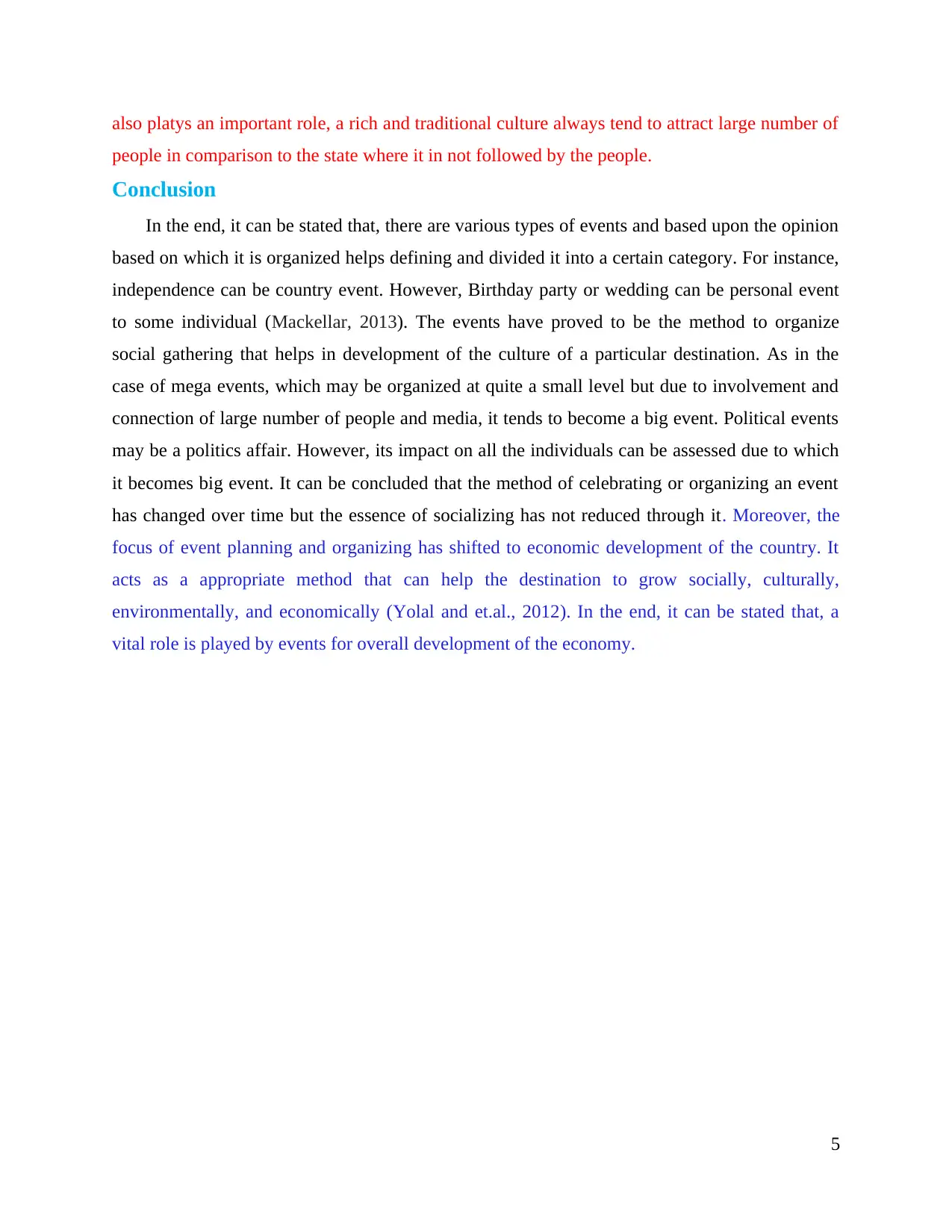
also platys an important role, a rich and traditional culture always tend to attract large number of
people in comparison to the state where it in not followed by the people.
Conclusion
In the end, it can be stated that, there are various types of events and based upon the opinion
based on which it is organized helps defining and divided it into a certain category. For instance,
independence can be country event. However, Birthday party or wedding can be personal event
to some individual (Mackellar, 2013). The events have proved to be the method to organize
social gathering that helps in development of the culture of a particular destination. As in the
case of mega events, which may be organized at quite a small level but due to involvement and
connection of large number of people and media, it tends to become a big event. Political events
may be a politics affair. However, its impact on all the individuals can be assessed due to which
it becomes big event. It can be concluded that the method of celebrating or organizing an event
has changed over time but the essence of socializing has not reduced through it. Moreover, the
focus of event planning and organizing has shifted to economic development of the country. It
acts as a appropriate method that can help the destination to grow socially, culturally,
environmentally, and economically (Yolal and et.al., 2012). In the end, it can be stated that, a
vital role is played by events for overall development of the economy.
5
people in comparison to the state where it in not followed by the people.
Conclusion
In the end, it can be stated that, there are various types of events and based upon the opinion
based on which it is organized helps defining and divided it into a certain category. For instance,
independence can be country event. However, Birthday party or wedding can be personal event
to some individual (Mackellar, 2013). The events have proved to be the method to organize
social gathering that helps in development of the culture of a particular destination. As in the
case of mega events, which may be organized at quite a small level but due to involvement and
connection of large number of people and media, it tends to become a big event. Political events
may be a politics affair. However, its impact on all the individuals can be assessed due to which
it becomes big event. It can be concluded that the method of celebrating or organizing an event
has changed over time but the essence of socializing has not reduced through it. Moreover, the
focus of event planning and organizing has shifted to economic development of the country. It
acts as a appropriate method that can help the destination to grow socially, culturally,
environmentally, and economically (Yolal and et.al., 2012). In the end, it can be stated that, a
vital role is played by events for overall development of the economy.
5
⊘ This is a preview!⊘
Do you want full access?
Subscribe today to unlock all pages.

Trusted by 1+ million students worldwide
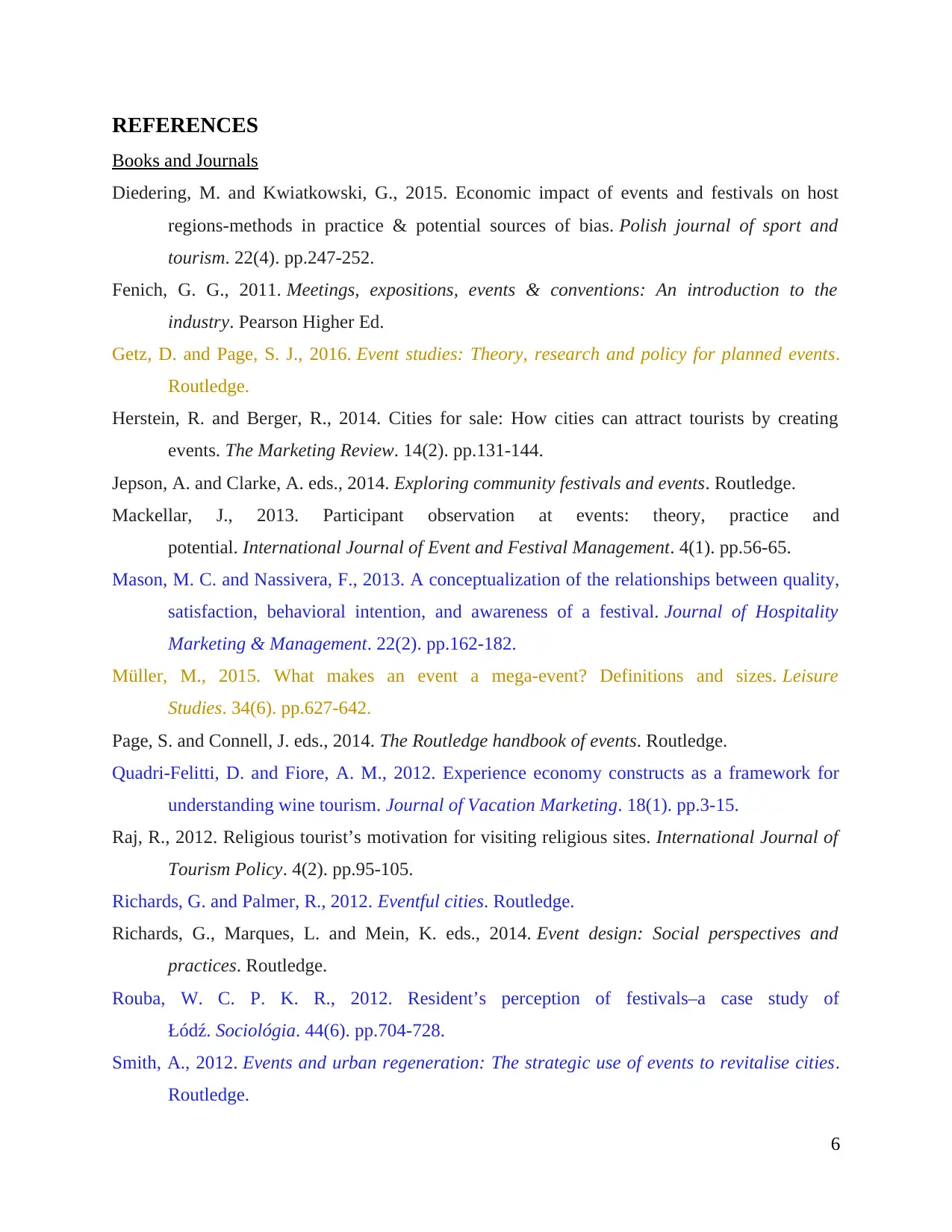
REFERENCES
Books and Journals
Diedering, M. and Kwiatkowski, G., 2015. Economic impact of events and festivals on host
regions-methods in practice & potential sources of bias. Polish journal of sport and
tourism. 22(4). pp.247-252.
Fenich, G. G., 2011. Meetings, expositions, events & conventions: An introduction to the
industry. Pearson Higher Ed.
Getz, D. and Page, S. J., 2016. Event studies: Theory, research and policy for planned events.
Routledge.
Herstein, R. and Berger, R., 2014. Cities for sale: How cities can attract tourists by creating
events. The Marketing Review. 14(2). pp.131-144.
Jepson, A. and Clarke, A. eds., 2014. Exploring community festivals and events. Routledge.
Mackellar, J., 2013. Participant observation at events: theory, practice and
potential. International Journal of Event and Festival Management. 4(1). pp.56-65.
Mason, M. C. and Nassivera, F., 2013. A conceptualization of the relationships between quality,
satisfaction, behavioral intention, and awareness of a festival. Journal of Hospitality
Marketing & Management. 22(2). pp.162-182.
Müller, M., 2015. What makes an event a mega-event? Definitions and sizes. Leisure
Studies. 34(6). pp.627-642.
Page, S. and Connell, J. eds., 2014. The Routledge handbook of events. Routledge.
Quadri-Felitti, D. and Fiore, A. M., 2012. Experience economy constructs as a framework for
understanding wine tourism. Journal of Vacation Marketing. 18(1). pp.3-15.
Raj, R., 2012. Religious tourist’s motivation for visiting religious sites. International Journal of
Tourism Policy. 4(2). pp.95-105.
Richards, G. and Palmer, R., 2012. Eventful cities. Routledge.
Richards, G., Marques, L. and Mein, K. eds., 2014. Event design: Social perspectives and
practices. Routledge.
Rouba, W. C. P. K. R., 2012. Resident’s perception of festivals–a case study of
Łódź. Sociológia. 44(6). pp.704-728.
Smith, A., 2012. Events and urban regeneration: The strategic use of events to revitalise cities.
Routledge.
6
Books and Journals
Diedering, M. and Kwiatkowski, G., 2015. Economic impact of events and festivals on host
regions-methods in practice & potential sources of bias. Polish journal of sport and
tourism. 22(4). pp.247-252.
Fenich, G. G., 2011. Meetings, expositions, events & conventions: An introduction to the
industry. Pearson Higher Ed.
Getz, D. and Page, S. J., 2016. Event studies: Theory, research and policy for planned events.
Routledge.
Herstein, R. and Berger, R., 2014. Cities for sale: How cities can attract tourists by creating
events. The Marketing Review. 14(2). pp.131-144.
Jepson, A. and Clarke, A. eds., 2014. Exploring community festivals and events. Routledge.
Mackellar, J., 2013. Participant observation at events: theory, practice and
potential. International Journal of Event and Festival Management. 4(1). pp.56-65.
Mason, M. C. and Nassivera, F., 2013. A conceptualization of the relationships between quality,
satisfaction, behavioral intention, and awareness of a festival. Journal of Hospitality
Marketing & Management. 22(2). pp.162-182.
Müller, M., 2015. What makes an event a mega-event? Definitions and sizes. Leisure
Studies. 34(6). pp.627-642.
Page, S. and Connell, J. eds., 2014. The Routledge handbook of events. Routledge.
Quadri-Felitti, D. and Fiore, A. M., 2012. Experience economy constructs as a framework for
understanding wine tourism. Journal of Vacation Marketing. 18(1). pp.3-15.
Raj, R., 2012. Religious tourist’s motivation for visiting religious sites. International Journal of
Tourism Policy. 4(2). pp.95-105.
Richards, G. and Palmer, R., 2012. Eventful cities. Routledge.
Richards, G., Marques, L. and Mein, K. eds., 2014. Event design: Social perspectives and
practices. Routledge.
Rouba, W. C. P. K. R., 2012. Resident’s perception of festivals–a case study of
Łódź. Sociológia. 44(6). pp.704-728.
Smith, A., 2012. Events and urban regeneration: The strategic use of events to revitalise cities.
Routledge.
6
Paraphrase This Document
Need a fresh take? Get an instant paraphrase of this document with our AI Paraphraser
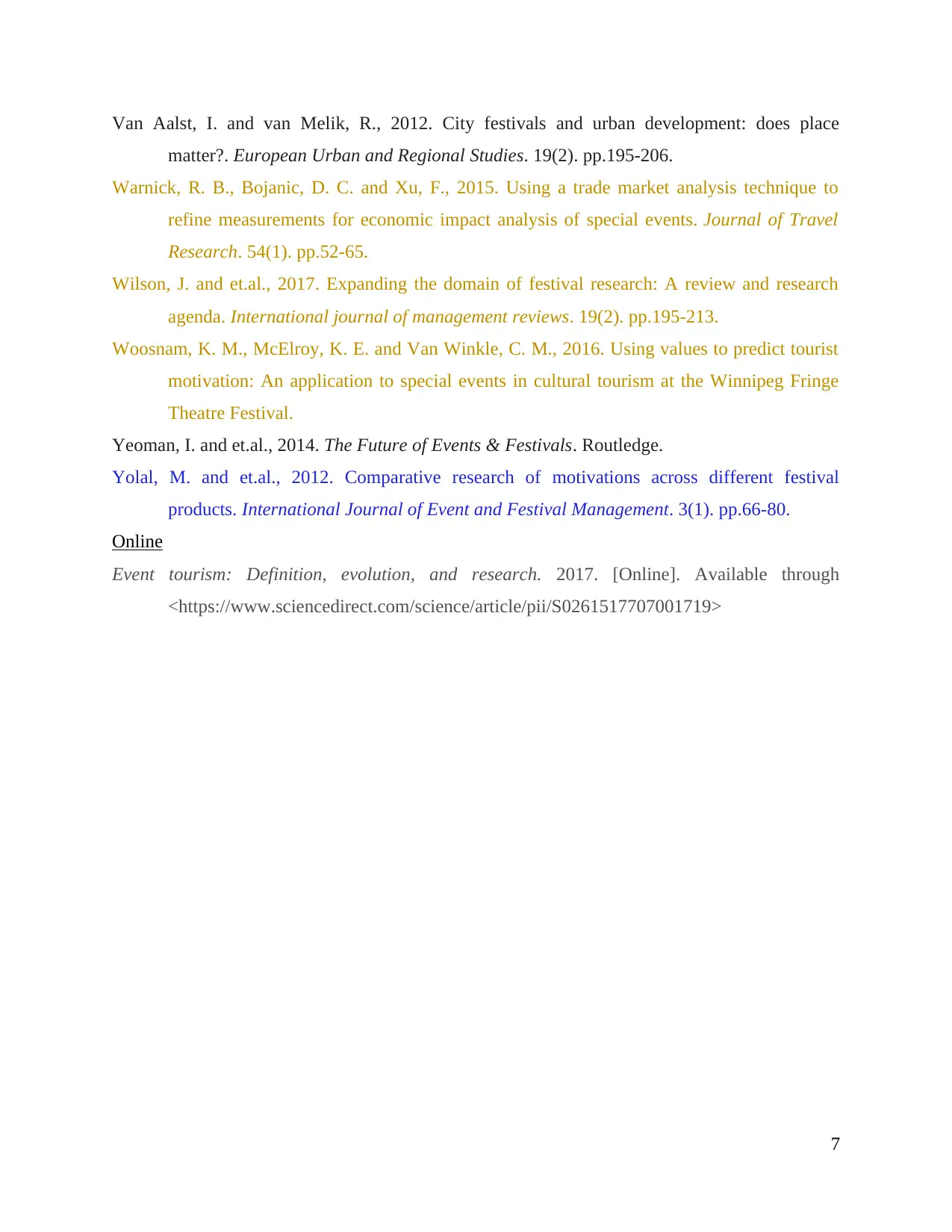
Van Aalst, I. and van Melik, R., 2012. City festivals and urban development: does place
matter?. European Urban and Regional Studies. 19(2). pp.195-206.
Warnick, R. B., Bojanic, D. C. and Xu, F., 2015. Using a trade market analysis technique to
refine measurements for economic impact analysis of special events. Journal of Travel
Research. 54(1). pp.52-65.
Wilson, J. and et.al., 2017. Expanding the domain of festival research: A review and research
agenda. International journal of management reviews. 19(2). pp.195-213.
Woosnam, K. M., McElroy, K. E. and Van Winkle, C. M., 2016. Using values to predict tourist
motivation: An application to special events in cultural tourism at the Winnipeg Fringe
Theatre Festival.
Yeoman, I. and et.al., 2014. The Future of Events & Festivals. Routledge.
Yolal, M. and et.al., 2012. Comparative research of motivations across different festival
products. International Journal of Event and Festival Management. 3(1). pp.66-80.
Online
Event tourism: Definition, evolution, and research. 2017. [Online]. Available through
<https://www.sciencedirect.com/science/article/pii/S0261517707001719>
7
matter?. European Urban and Regional Studies. 19(2). pp.195-206.
Warnick, R. B., Bojanic, D. C. and Xu, F., 2015. Using a trade market analysis technique to
refine measurements for economic impact analysis of special events. Journal of Travel
Research. 54(1). pp.52-65.
Wilson, J. and et.al., 2017. Expanding the domain of festival research: A review and research
agenda. International journal of management reviews. 19(2). pp.195-213.
Woosnam, K. M., McElroy, K. E. and Van Winkle, C. M., 2016. Using values to predict tourist
motivation: An application to special events in cultural tourism at the Winnipeg Fringe
Theatre Festival.
Yeoman, I. and et.al., 2014. The Future of Events & Festivals. Routledge.
Yolal, M. and et.al., 2012. Comparative research of motivations across different festival
products. International Journal of Event and Festival Management. 3(1). pp.66-80.
Online
Event tourism: Definition, evolution, and research. 2017. [Online]. Available through
<https://www.sciencedirect.com/science/article/pii/S0261517707001719>
7
1 out of 8
Related Documents
Your All-in-One AI-Powered Toolkit for Academic Success.
+13062052269
info@desklib.com
Available 24*7 on WhatsApp / Email
![[object Object]](/_next/static/media/star-bottom.7253800d.svg)
Unlock your academic potential
Copyright © 2020–2026 A2Z Services. All Rights Reserved. Developed and managed by ZUCOL.





